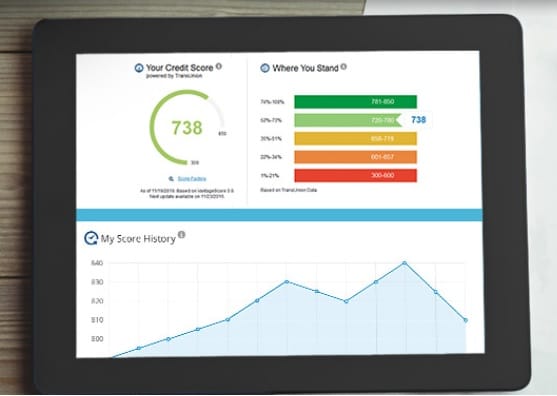Anybody can apply for a credit card, but not every application gets approved. If you don’t know your credit score when you apply for a travel credit card, you run the risk of receiving the dreaded “Application Denied” application decision. Your credit score is the most important factor because it lets the credit card issuer see if you’ve responsibly managed your previous credit cards.
Thankfully, it only takes a few minutes to learn your credit score so you don’t waste a credit card application.
What is a Credit Score?
Before we find out why it’s important to know your credit score, you need to know what a credit score contains:
- Payment history-35%
- Amounts owed-30%
- Length of credit history-15%
- Types of credit-10%
- New credit-10%

The most common credit score is the FICO score that ranges from 300 to 850. You will need a credit score of at least 700 to be approved for most travel credit cards.
Your credit score reflects how well you’ve managed credit for the last 10 years by including the data for any credit cards and loans you’ve had during that time. Having a positive payment history–where you pay your bill on time every month–will cause your score to be higher.
As you might expect, missing a payment or defaulting on a loan or credit card balance will cause your credit score to be lower.
It takes time to build an excellent credit score; an 18-year-old high school graduate won’t have an 800 credit score, but they will in a few years if they responsibly manage the credit they have by starting with a beginner credit card to establish a consistent credit card payment history until they can upgrade to a travel credit card that requires excellent credit.
Don’t Forget About Hard Credit Inquiries
In addition to knowing your credit score–804, 755, 633, etc.–you also need to be aware of how many “hard” credit inquiries are on your credit report in the last two years.
Any time you apply for a new credit card or loan, your credit score will temporarily lose a few points and the application will be notated on your credit report for the next 24 months.
Most credit score experts recommend keeping your number of inquiries to a maximum of three hard inquiries within a rolling two-year period.
Most credit card companies don’t pay much attention to how many recent credit inquiries you’ve had in the last 24 months, but you need to remember the Chase 5/24 rule. Even if your credit score is sufficient, Chase will automatically decline your application on select credit cards if you have applied for at least five credit cards or listed as an authorized user in the most recent 24 months.
Your Credit Card History is Very Important
Owning a no annual fee credit card is arguably the best way to build your credit score because you don’t pay any fees or interest as long as you pay your balance in full each month.
Borrowing money to buy a home or car can improve your credit score too once you establish a payment history, but you pay interest on the outstanding balance so you have to “pay” to build your credit score.
Besides being a free way to build your credit, owning a credit card improves your approval odds for future credit card applications. This is because credit card companies prefer to see responsible credit card use before you apply for a better credit card because credit cards are a revolving credit account where you can add to the balance each month.
Responsible paying off a car loan or student loan will improve your approval odds too, but just like an auto loan lender prefers to see previous auto loan payment history before other loan payment histories, credit card issuers first look at any credit card payment history you have.
What Credit Score is Needed for Travel Credit Cards?
Below is a quick guide to credit cards you might be qualified for if depending on your credit score. If you don’t know your credit score, you can access your credit score for free with Credit Karma. You can also read user reviews for many travel credit cards to see what the typical credit score for successful applicants is.
Investing a few minutes to research the credit score requirements can be well worth the time.
Travel Credit Cards for Average Credit: 640-749
If you’re a traveler with an average credit score ranging between 640 and 749, you will qualify for most travel credit cards, especially if it’s in the low or mid-700s.
When your credit score is on the lower end of the spectrum, the credit card issuer might look at your annual household income to make an approval decision. If they approve your card application, you might receive a smaller credit limit than someone with a higher credit score or annual income.
In most cases, your approval odds will be highest for co-brand airline and hotel credit cards if you have average credit. Once your credit score crosses the 700 threshold, your approval odds will be higher for some of these flexible travel credit cards that earn bonus points on every travel purchase:
- Chase Sapphire Preferred credit score
- Chase Sapphire Reserve credit score
- Bank of America Travel Rewards
Travel Credit Cards for Excellent Credit: 750-850
After you’ve responsibly owned another credit card for a couple years, there’s a good chance that your credit score will be at least 750 points. Your score can climb sooner if you’ve responsibly borrowed money for other types of loans like student loans, auto loans, and a home mortgage.
Don’t borrow money just to improve your credit score, but make sure you pay your statement balance in full every month to avoid any potential credit score penalties.
Your approval odds when you apply for the Sapphire Preferred and other premium travel credit cards like the American Express Platinum Card or the Sapphire Reserve will be higher than if you’re closer to the 700 range.
And, you can also put the premium airline and hotel credit cards on your watchlist too. These premium co-brand credit cards offer the most elite travel benefits that you might enjoy if you are loyal to a particular travel provider.
Your reward for building excellent credit is exclusive access to the best travel credit cards. Sure, travelers with lower credit score can probably handle these high-end credit cards responsibly, but the credit card companies require everybody to prove they can responsibly handle credit before their application for their flagship products is approved.
Do You Know Your Credit Score Now?
There’s nothing worse than having a credit card application declined. Not only is it an embarrassing event, but you might have to wait for the inquiry to drop off your credit report before you apply again. In the meantime, you miss out on some bonus offers and travel rewards that could have helped you save some serious cash by booking free flights and nights.




